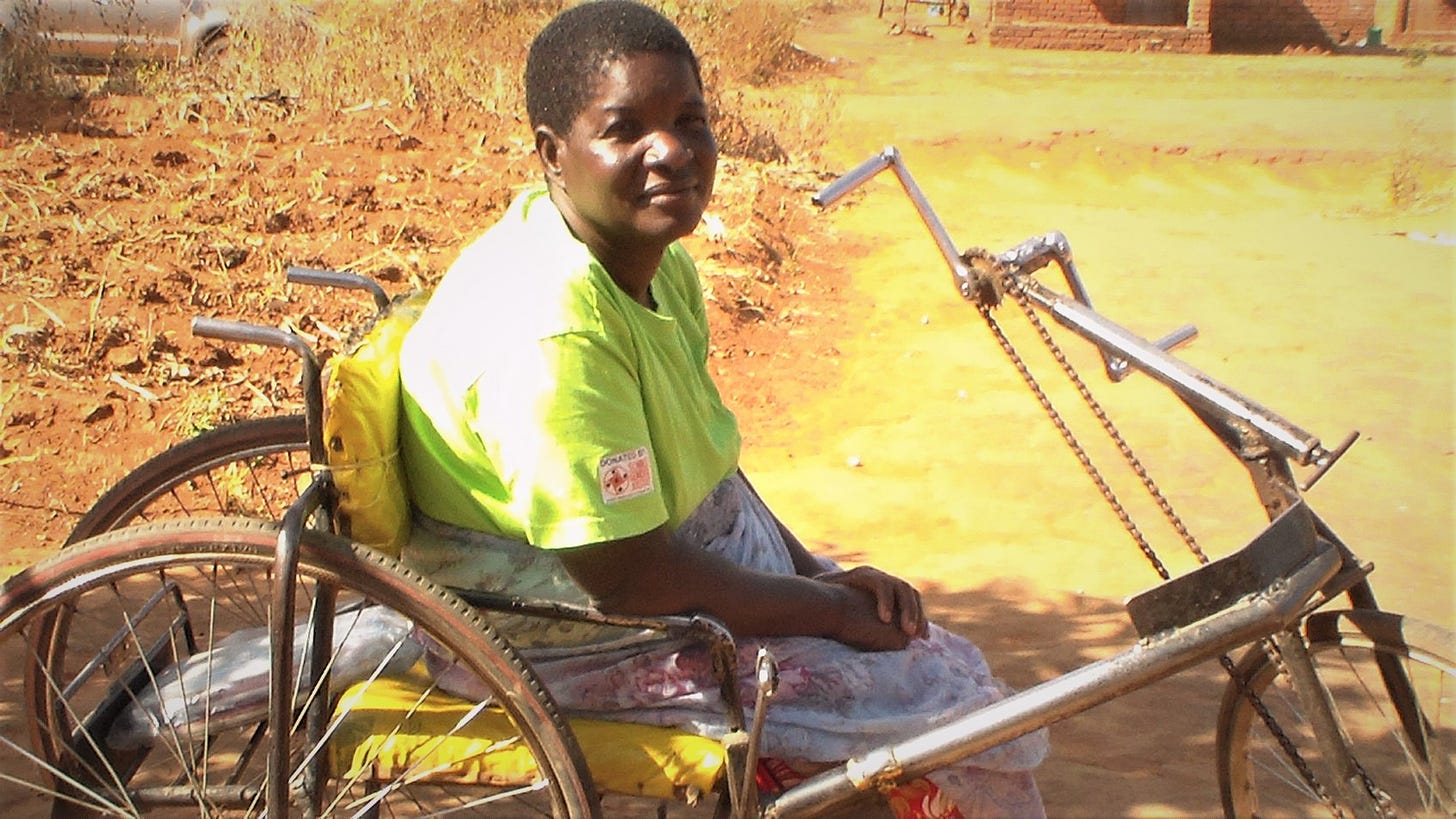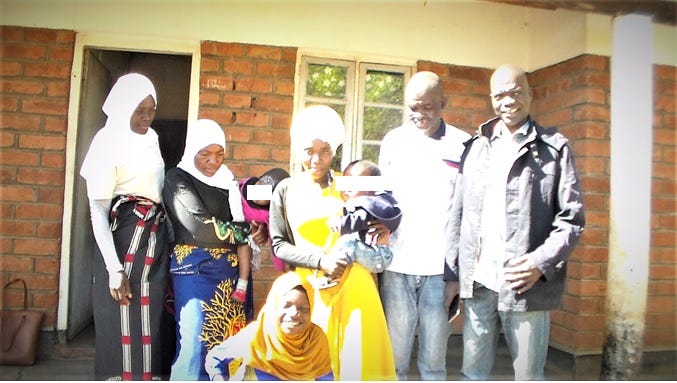Painful reality that children with disabilities face
Only 1.3% of the children with disabilities are benefiting from government social security or disability grants.
Mchinga, Malawi-The day started just fine. It was business as usual, and Lukaya Owen, a 21-year old mother of two children, went on doing her daily household chores, writes Raphael Mweninguwe.
But as it was getting to around midday, something just happened: one of her two children fell sick and unconscious.
The child was then taken to Machinga district hospital in the southern region of Malawi, where doctors described the condition as “serious”.
This happened in 2018, and at the time, the child was in a coma for nearly a week before gaining consciousness.
The child could hardly speak, and her body was stiff. She had suffered from cerebral malaria, and that is how the life of Hostina Adam, who is now 5, changed.
She was diagnosed with cerebral palsy, a condition that affects a person's ability to move and maintain balance and posture. She was attacked by severe malaria one year after she was born.
Hostina’s family relies on farming. Now that she lives with a disability, her family needs to care for her and monitor her all the time. She cannot walk, eat, or go to the bathroom alone.
Owen says she cannot do any income-generating activity, nor can she ask a relative or neighbour to look after her child because nobody is ready to care for a child with a disability.
Unlike many other families that are on government social support, Owen is not. And this makes the lives of her and the child more complicated. Apart from seasonal farming, her husband is not working.
Owen says she doesn't know why she is not getting support from the government through the social cash transfer programme, despite her many attempts to get registered.
The process for one to be on the list of beneficiaries is done by committees which work with government and local chiefs. In some social grants, chiefs are not involved and when asked why many people with disabilities are left out, Paramount Chief Kawinga of Machinga district admits that not many people living with disabilities are being assisted.
“We have a number of social programmes in our villages, but many of these are managed by different organisations, including the government, and the chiefs in most of them have no say. There are a number of obstacles that people living with disabilities face,” he says.
Stigma and discrimination are the other obstacles that they have to navigate. Most families with children living with disabilities are being stigmatised, a situation that forces some parents to even lock their children in their homes.
“But for me, I do not do that. I have accepted it,” she says.
“Of course some parents do lock their children with disabilities in their homes, but we encourage them not to do that because it is wrong and a violation of their rights,” says Kawinga.
Niziya Chintengo is a 3-year-old girl. She, too, suffers from cerebral palsy, which was also onset from cerebral malaria. Her mother, Miriam Songolo, says her child was born healthy.
“She fell sick on the eighth month of her birth, and when I took her to the hospital, doctors said she had malaria. She was unconscious for eight days, and after regaining consciousness, she could hardly move her body. That is how her disability began,” she says.
Songolo narrates her story with tears running down her cheeks. Her husband abandoned her and has since married another woman.
“He told me I had brought a disability into the house. And he said he was not ready to stay with a child or care for her because of the condition the child is in,” she says.
Niziya has been receiving medical help at the district hospital as well as physiotherapy at the Malawi Council for the Handicapped (Macoha) Rehabilitation Centre, a government statutory organisation that has an office in Machinga district in Ntaja in Traditional Authority Kawinga in the Southern Region of Malawi.
Since starting her rehabilitation at the centre, Niziya has made significant improvements. She is able to speak, stand, walk, and also eat on her own. She chats with friends, and her mother now thinks of taking her to a nearby nursery school within the village.
David Milanzi, Macoha’s Rehabilitation Assistant, says Naziya, unlike many other children, has made significant improvements in a short period of time because her condition was not severe.
He says that where the situation is worse and there is a need for an operation, the children are sent to Beit Cure International Hospital in Blantyre.
“Not all children respond the same to treatment. Others are slow, and we know that they will improve in the long run. It also depends on the parents’ willingness to have their children treated, because there are some who do not take their children for physiotherapy on a regular basis. And this contributes to children’s quick recovery,” he says.
According to a study done in 2017, there are 15,000 children in Malawi living with disabilities. At the Macoha Rehabilitation Centre in Machinga, for example, over 450 children from Machinga, Mangochi, Balaka, Ntcheu, and neighbouring Mozambique are being treated for their disabilities.
The number of children with disabilities in these districts is much higher, but the problem is that many of them do not have the means in terms of transport to travel for physiotherapy.
An estimated 3.2% of children in Malawi aged 2-4 and 3.3% aged 2–17 live with disability, according to a study published by UNICEF in 2020. A number of these children are not on government social protection programmes such as social cash transfers.
Only 1.3% of the children with disabilities are benefiting from government social security or disability grants.
Mary Lifa, Chairperson of Parents of Disabled Children Association of Malawi (PODCAM), based in Machinga district, points out discrimination as the cause of the problem. She says many families do not attend meetings where beneficiaries are registered because of mobility problems, and in the process, they are left out.
“It is not that they do not know how to apply because even many of those who are supported by the social transfer do not know how to make an application, but they are registered by the committees. Most of them are deliberately left out due to discrimination,” she says.
Although Niziya is not on any government social protection programmes, her mother says she is optimistic that her child will improve for the better with the treatment that she receives from doctors at the health facility and Macoha.
But for Hostina, the condition seems not easy for her, as in many cases she is not taken for physiotherapy because the facilities are difficult to reach and her recovery is too slow. Her mother, however, is optimistic that things will improve.
The mothers and carers in Machinga have formed a grouping, which is chaired by Songolo. They meet regularly at the center. Among other things they learn how to provide home physiotherapy to their children and how to prepare balanced diets for their children.
“We are trained [by Macoha] how to do physiotherapy. One of the problems facing our children is lack of proper treatment at home such as providing them with physiotherapy. We also learn how to cook and how to do small scale income generating activities,” says Songolo.
She explains that women who care for children with disabilities face a number of problems that range from stigma, discrimination and financial problems. She says in some cases even their own members of their families refuse to give the children with disabilities the support that they need.
Addressing poverty
One of the problems facing children with disabilities and their caregivers is poverty. Through a cash transfer programme, the government says it is addressing this problem by giving grants to families that are poor including those families with children living with disabilities.
Ministry of Gender, Children, Disability and Social Welfare spokesperson, Pauline Kaude denies allegations of discrimination by the government against children and any other person with disabilities.
She explains that the social cash transfer that the government has been implementing since 2006 has benefitted 293,000 households of which she claims 13% are households of people living with disabilities.
Data available on the government website gives the total number of households beneficiaries and are recorded as female headed households and male headed households. They do not give a breakdown of the number of households with people living with disabilities.
But not everyone agrees with the government. Some of those living with disabilities or have children with disabilities argue that the number of people benefiting from the government social protection programmes “is just too small.”
“In many government social support programmes, people with disabilities are discriminated against,” says Lifa.
Lifa, who is herself living with disability, says many children, even parents with disabilities are not on the list of beneficiaries. She says the chiefs, who in many cases are used as vehicles to register the poor to benefit from social support such as social cash transfer, also sideline them.
Lawrence Khonyongwa, Executive Director of Malawi Network of People Living with HIV and AIDS (Manet+) echoes Lifa’s sentiments. He says children living with disabilities and those living with HIV and AIDS are sidelined in a number of social support programmes from the government and that include the agriculture subsidies.
“There are many children in Malawi that are living with disabilities. Their parents or caregivers are struggling to support them and yet here we have a social cash transfer programme which they are not benefiting from,” he says.
Paramount Chief Kawinga says a number of children with disabilities do not benefit from social support programmes but he says it is now time that children with disabilities should start receiving such support.
“We have so many people with disabilities and many of them do not benefit from these social cash transfer programmes,” he says.
“Whatever the case, children with disabilities need the support from mothers, caregivers and government to help them to realize their dreams. Putting a stigma on them will not help solve their problems,” says Lifa.
Children living with disabilities in Malawi are facing difficult challenges such as stigma and discrimination. In some cases family members lock them up in the homes for fear of people who would laugh at them.
Despite all these challenges many families and societies have come to realise that children with disabilities deserve special care and treatment like any other able bodied child. And this is what Owen and Songole are fighting for.




